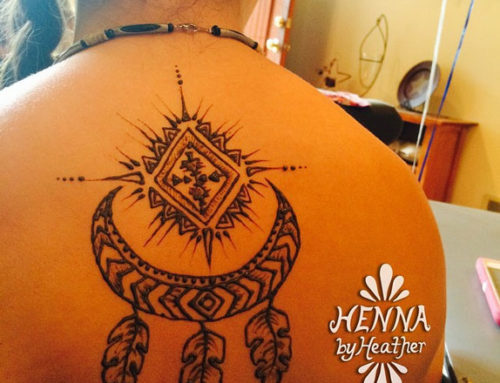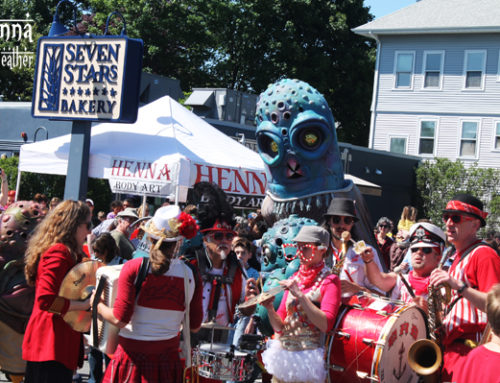Henna By Heather
Henna FAQ
copyright 1999, 2002, 2005, 2009, 2011, 2013, 2014, 2017 Heather Caunt-Nulton
What colors of henna are available?
Henna is a natural plant dye, which stains an orange to reddish-brown color. Some people call other temporary body art “henna”, but true henna is from the henna plant (latin name: lawsonia inermis). Henna is never, ever black. “Black henna” is not relying on henna to dye the skin at all, but rather PPD, a harsh chemical dye. A more insidious version of unsafe henna is chemically-laced, adulterated henna. Mystery chemical dyes are added to pastes and then still disingenuously marketed as “natural”. If your henna stains a color other than a faint, light orange when it is first removed, *especially* if it says any particular color on the label, you know you have chemically laced bad-news not-natural henna.
Note that there are a variety of other safe temporary body art options available in many, many colors. Face paint, temporary tattoo paints, and gilding gel /a> are all very popular and safe colorful alternatives to henna.
More and more, people keep asking about white henna. There is no such thing as white henna, technically, since, as we’ve mentioned, henna refers specifically to a natural plant dye that ranges in color from orange to reddish brown. But designs can be done in white, or even a beautiful and rich bridal off-white cream kind of color, using specialty products such as Artistic Adornment’s “White Henna” Kit, which is really a professional cosmetic adhesive and high-lustre, top-quality mica powder.
Where can I get the best quality henna?
The best quality henna I have ever used professionally in my 15 years as a henna artist is available for sale at ArtisticAdornment.com. Artistic Organic Henna, sourced from the Indian state of Rajasthan, is a popular favorite. The fact that it is organic and helping create more sustainable farming options is an added bonus! Mohana henna is another very popular brand of safe, natural henna – it has a fine sift and rich color.
Be very careful where you buy your henna. Most henna in grocery stores will yield disappointing results. Even if it started out as good, pure, finely sifted henna (and *very* few do start out at optimal quality), henna is perishable, and great care must be taken in storing the powder properly. If it is exposed to excessive heat or moisture, it will lose dye potency. Many Indian / Middle Eastern grocery store owners do not know or care about this, and will let their henna go stale on their shelves.
Of over 30 brands/sources of henna I have tried, very few have been high enough quality for me to feel good about using on paying clients.The vast majority I would never use on paying clients because the results can be very disappointing. Your best bet is to go to a professional henna artist who has been doing henna body art for a decade or longer, who has really had time to perfect her craft and know how to mix the most potent natural henna paste possible. When doing henna yourself, be sure to use the best available henna powder for the best results.
What is in your henna paste?
My henna paste is made with the premium quality 100% natural henna from ArtisticAdornment.com. I mix my own recipe of juices, teas, and essential oil with the henna powder to make it into the paste that is painted onto the skin. The henna kits at ArtisticAdornment.com include the same ingredients as I use in my own henna paste, and give step by step instructions for how to mix your own paste.
The basic ingredients are:
100g Artistic Organic henna powder
1oz Cajeput essential oil
1.25 cups of Lemon juice
These are usually the only ingredients I put in my paste.
Sometimes I try new things – a different source of citric acid, a different essential oil with monoterpene alcohol, or an essential oil that is added purely for aromatherapeutic purposes. Ask what’s in the henna I’ve created for a particular occasion to find out exactly what’s in it. If you have any plant allergies, please let me know so that I can advise as to whether or not you may be allergic to the oils or juices typically used to make henna paste. A simple recipe made only with lemon juice or even just with water is always an option.
Current recipe and ingredient information can be found here:
http://henna.artisticadornment.com/henna-recipe/
How long will it last?
Henna will last until the skin it dyes exfoliates. This is typically 1-3 weeks, with an average of about 10 days. However, henna can last as long as 8 weeks on the thick soles of your feet, or go away as quickly as 3-4 days on very thin parts of your skin (like your face).
Is henna safe? Yes!
As mentioned above, henna is 100% natural. Henna is one of the safest cosmetics ever used, and allergies are so rare as to seem nonexistent. I have never had a customer report an allergy to henna itself, even those who have many other allergies. A patch test is still a good idea if your skin is particularly sensitive. It seems that citrus allergies are far more common than allergies to henna; as there are often citrust ingredients (almost always lemon juice) in our henna paste, please advise if you have citrus allergies.
Is henna a tattoo? Does it hurt? No.
In English, there are no useful words to describe a henna stain ornamenting the skin, so henna designs are frequently called “henna tattoos”. Hennaed skin is not tattooed. Unlike a tattoo, henna only dyes the outermost layers of the skin. No needles are used. Henna is painted onto the surface of the skin. Having henna applied feels like having your skin decorated with pudding. The process is relaxing and pleasant. It is a little wet and cold – so it is most enjoyable to have done in the summer!
How does it work?
Henna dyes the upper layers of your skin using completely natural processes. Henna contains the lawsome molecule, which dyes organic matter like hair, skin, fingernails, and natural fibers. It takes time for the lawsome to bind with cells, so the henna paste must stay moist and in contact with the skin for as long as possible. Heat also makes the dye stain a darker, deeper color.
Is henna edible?
Why do you want to eat henna?? Henna is not approved for consumption by the FDA. Technically, we suppose you could eat plain henna leaf powder, but in no way whatsoever recommend that you do. No, really though – why do you want to eat henna? We heard people were searching the internet trying to find answers to this question…. but we have no idea what the appeal would be. Please let us know.
While we’re discussing the edibility of henna, please note that the cajeput essential oil that most professional henna artists put in their henna paste is very bad for kitties; be careful when mixing your henna!
Check out our About Henna category for all related content.




